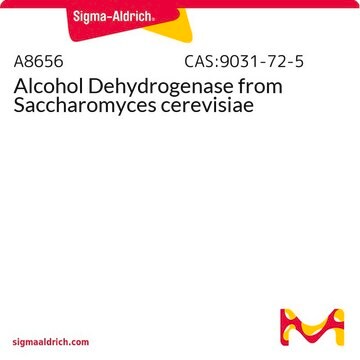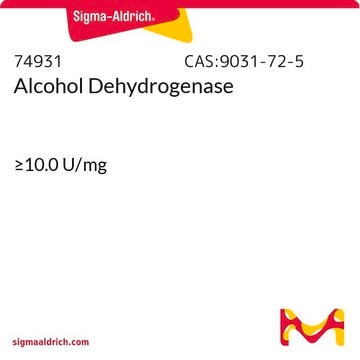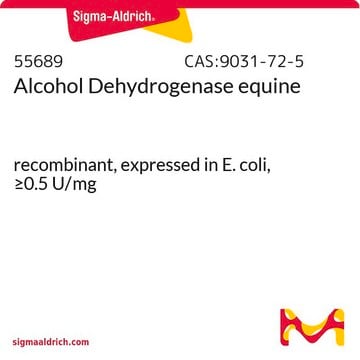A3263
Alcohol Dehydrogenase from Saccharomyces cerevisiae
powder, ≥300 units/mg protein, mol wt ~141,000 (four subunits)
Synonym(s):
ADH1, ADH, Alcohol Dehydrogenase from yeast, Alcohol:NAD+ oxidoreductase
About This Item
Recommended Products
biological source
bakers yeast
form
powder
specific activity
≥300 units/mg protein
mol wt
~141,000 (four subunits)
purified by
crystallization
storage condition
(Tightly closed. Dry)
greener alternative product characteristics
Waste Prevention
Design for Energy Efficiency
Learn more about the Principles of Green Chemistry.
sustainability
Greener Alternative Product
color
beige
optimum pH
8.6-9.0
suitability
suitable for recycling micro-assay of β-NAD and β-NADH
UniProt accession no.
greener alternative category
storage temp.
−20°C
Looking for similar products? Visit Product Comparison Guide
General description
Yeast alcohol dehydrogenase 1 (ADH1) belongs to the family of zinc-containing alcohol dehydrogenases. It is a homotetramer with each subunit containing one catalytic domain and coenzyme-binding domain.
We are committed to bringing you Greener Alternative Products, which adhere to one or more of The 12 Principles of Greener Chemistry. This product has been enhanced for energy efficiency and waste prevention when used in fuel cell research. For more information see the article in biofiles.
Application
Biochem/physiol Actions
Isoelectric point: 5.4-5.8
Optimal pH: 8.6-9.0
Substrates: Yeast ADH is most active with ethanol and its activity decreases as the size of the alcohol increases or decreases. Branched chain alcohols and secondary alcohols also have very low activity.
KM (ethanol) = 2.1 × 10-2 M
KM (methanol = 1.3 × 10-1 M
KM (isopropanol) = 1.4 × 10-1 M
Inhibitors: Compounds that react with free sulfhydryls, including N-alkylmaleimides and iodoacetamide.
Zinc chelator inhibitors, including 1,10-phenanthroline,
8-hydroxyquinoline, 2,2′-dipyridyl, and thiourea.
Substrate analogue inhibitors, including β-NAD analogs, purine and pyrimidine derivatives, chloroethanol, and fluoroethanol.
Extinction Coefficient: E1% = 14.6 (water, 280 nm)
Specifications
Unit Definition
Physical form
antibody
Signal Word
Danger
Hazard Statements
Precautionary Statements
Hazard Classifications
Resp. Sens. 1
Storage Class Code
11 - Combustible Solids
WGK
WGK 1
Flash Point(F)
Not applicable
Flash Point(C)
Not applicable
Personal Protective Equipment
Certificates of Analysis (COA)
Search for Certificates of Analysis (COA) by entering the products Lot/Batch Number. Lot and Batch Numbers can be found on a product’s label following the words ‘Lot’ or ‘Batch’.
Already Own This Product?
Find documentation for the products that you have recently purchased in the Document Library.
Customers Also Viewed
Protocols
To measure alcohol dehydrogenase activity, this assay uses β-nicotinamide adenine dinucleotide phosphate and a continuous spectrophotometric rate determination at 340 nm.
Our team of scientists has experience in all areas of research including Life Science, Material Science, Chemical Synthesis, Chromatography, Analytical and many others.
Contact Technical Service









